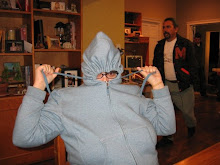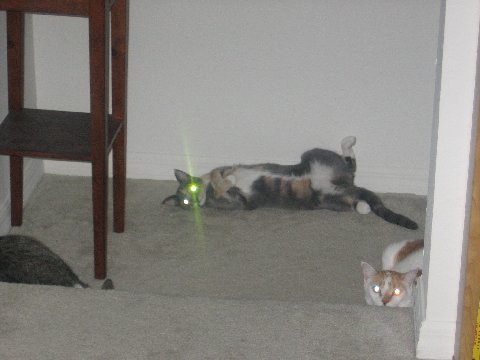 FTC Disclosure: I Mooched this book.
FTC Disclosure: I Mooched this book.I believe I first heard of Upton Sinclair's The Jungle during Mr. Weimert's American History class in high school. I knew it held a major place in our history, but the details were fuzzy. If I remember correctly, Sinclair was known as a "muckraker," one of those investigative journalists who exposed the corruption and scandal of which the American public was (wilfully?) ignorant. Upon reading the copy on the covers of my book, I learned that in writing The Jungle Sinclair sought to unify workers. What resulted, instead, was the Pure Food and Drug Act.
The Jungle is the story of Jurgis Rudkus, a Lithuanian immigrant who came to the meat-packing district of Chicago to seek his fortune. He brought with him his new bride, Ona, and a host of other family members for whom he had to care. He obtained a job at Durham's meat-packing plant as soon as he arrived, and spend a good portion of the book working for Durham's. During his time there, he observed the absolutely horrifying conditions under which the men (and women) worked, the disgusting things, both natural and unnatural, that tainted the U.S. meat supply, and the corruption and favoritism that existed in the upper ranks.
The Rudkus family endure tragedy after tragedy. The book is not light, by any stretch of the imagination. Every time something happened to Jurgis or the family, I kept frantically turning the pages, waiting to see how they would get out of it. Then I was kept frantically turning the pages to see what could possibly happen to them next. Their many tribulations seemed too much to bear. At one point, I remember thinking that it was the end for the Rudkus family, but there was half of the novel left! Eventually, the family does break apart and Jurgis finds himself a criminal, a pauper, and a societal outcast...until he positions himself as a cog in the political machine. Finally, at the end of the novel, Jurgis discovers socialism and begins to work to organize the laborers and spread the wealth.
This book was tremendously sad. It was especially poignant for me these days, as I've currently been struggling to readjust our lifestyle to one income, with my husband out of work. I felt as though I could really understand Jurgis' stress over being out of work, how they would pay their bills, etc. It hit very close to home for me.
The book was also quite disgusting. I would not recommend it for those with a sensitive stomach. It is amazing to me how terrible the conditions were in the meat-packing plants: no air or light for the workers, filth and contamination all around, disease and vermin infesting the factories...as I said in an earlier post, it's enough to persuade one to become a vegetarian.
While I enjoyed the book overall, and found it much more of a page-turner than I anticipated, I didn't like the end. The last chapter or so is basically just socialist propaganda. I'm not even that opposed to the ideals of socialism (i.e., fair labor, sharing of wealth among many), but it was a bit much. The speeches went on for pages and it made the ending rather anticlimactic for me.
Overall, however, I give The Jungle three and a half out of five Whatevers. It's an important historical novel, which gives a good view of American big-city life at the turn of the last century.




6 comments:
This is one of those books that I often think I'd be interested in reading, but then I, uh, really don't want to be a vegetarian, so I'm a little frightened of it. Sometimes ignorance really is bliss. Great review, though! =)
I hope things get better for you and your husband soon. Sounds like a really tough situation. I'll be thinking about you both.
I just read the Jungle about 2 years ago... There are some well written and descriptive scenes that will stay in my memory forever. I think the way Sinclair paralleled the exploitation and hopelessness of the immigrants next to the barbaric treatment of "food" animals was brilliantly insightful.
But a word or question to Megan ---It's strange to hear someone outright say they enjoy their "bliss". And they would avoid knowledge to continue a practice which may be changed by information... It seems that train of (non)thought leads to all sorts of social ills. What if we "didn't want to know" about the plantation slaves? Or wanted to turn away from children who were beaten and forced into sweat shops?
The point is - Our moral compass always points to compassion... If reading a book may trigger this reaction - I'd say don't fight it... A better world depends on awake people being strong enough to change injustices! ;)
Megan:
I was frightened of it because of its "classic" status...sometimes the classics can be hard to read. But it ended up being a pretty interesting and enjoyable read. I feel like I really did learn something by reading it. But I know what you're saying. That's the reason I haven't read any of Michael Pollan's books or gotten into the whole "locavore" thing. And thank you for thinking of Ricky and I. :)
Bea:
Thank you for stopping by! As I said above, I understand where Megan is coming from. I like meat. And I'm lazy. And most of us don't like to be forced to think about things that are outside of our "comfort zone." So the atrocities in the meat-packing plants of yesteryear (and, from what I've seen around the blogosphere, the meat industry even today!) are not things any of us WANT to think about. Sometimes it just takes an extra kick in the pants to force ourselves to do what we think we should do, but don't really want to do.
I agree that the juxtaposition of the workers against the animals was interesting. I see that now that I've finished the book, but I wish I'd thought more deeply about it while reading.
Just curious Lexi... What would that "extra" kick in the pants look like? Another brutal investigation of animal cruelty? Another dangerous "meat" recall? An environmental story too severe to ignore? Just wondering what it takes... For me, it was that first image of a pig in a cage --- I realize for others it takes more... Just stumped as to what that is. Thanx.
Bea:
I think it's different for everyone. That's why we're not all animal activists. For me, I haven't reached the place where I'm ready to give up meat. And, honestly, I'm not sure I'll EVER reach that spot. I appreciate your position and you are certainly entitled to your beliefs. I hope you accord that same graciousness to me and the other guests of my blog.
Of course everyone is different - I did try to acknowledge that... And I'm not disrespecting your choice - I was just honestly curious what motivates some, but not others. In any case... Perhaps this newly released book by Dr. Melaine Joy "Why We Love Dogs, Eat Pigs and Wear Cows" might be of interest to you...
http://www.youtube.com/watch?v=DOCPDXvlGOQ
Post a Comment